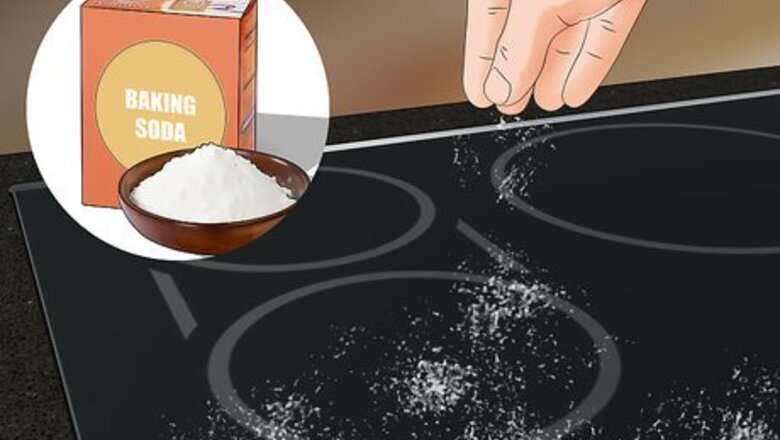
views
Doing Regular Cleaning
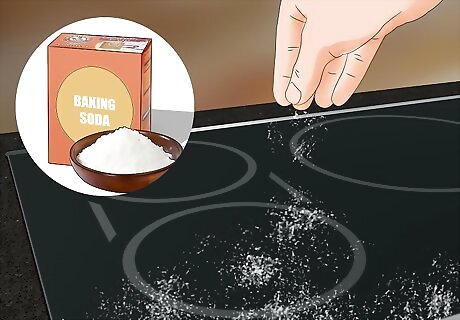
Sprinkle some baking soda over the cooktop. There’s no need to measure the exact amount of baking soda you use. Just open the lid to your baking soda container and apply enough to lightly coat the area of the stovetop you wish to clean. If your stovetop is really grimy, apply a heavier layer of baking soda. Old parmesan cheese containers are ideal for sprinkling baking soda. Similar containers with holes punched through the lids are equally useful. If you have such a container, fill it with baking soda. Sprinkle the baking soda from this container over the stovetop. To make the baking soda even more effective, some people choose to spray the baking soda with a spray bottle filled with vinegar. There’s no need to measure the volume of vinegar you spray over the area you’ve coated with baking soda. Just spray a light coat – enough to get the baking soda bubbling.
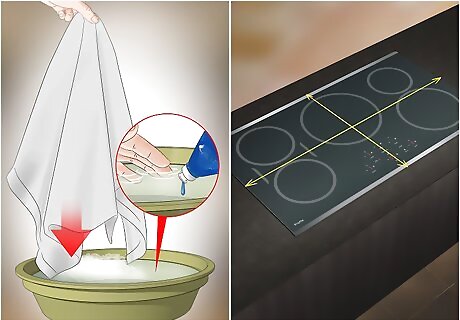
Soak a large rag in soapy water. Place a large dishrag in hot, soapy water. The rag should be large enough to cover the entire area that you applied baking soda to.
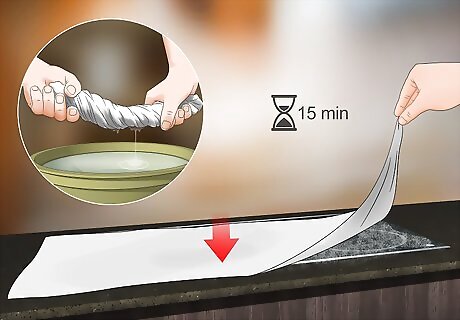
Place the rag over the baking soda. Remove the rag from the soapy water. Wring it out. It should be damp, not saturated. Lay the rag over the baking soda on the stovetop. Wait 15 minutes. If you’re trying to clean the entire surface of the stovetop, use a rag that covers the entire surface or a series of smaller rags that enable you to cover the whole surface.
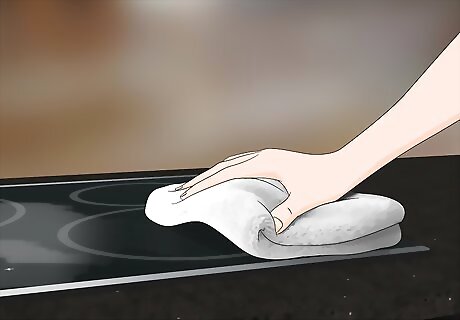
Wipe away the baking soda. Once you’ve let the dishrag sit on the stove for 15 minutes, use it to wipe the stovetop. Move it in a wide circle that cleans the area where you applied the baking soda. Once you’ve scrubbed the ceramic stovetop thoroughly, use a damp sponge or another damp dishcloth to clean the remaining baking soda residue from the stovetop. Allow it to air-dry. You might want to wear gloves during the wiping stage.
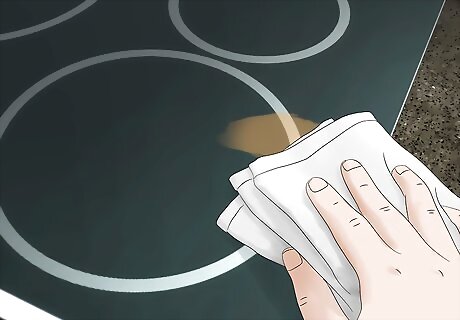
Clean spills as soon as possible. If you spill something on your ceramic stovetop and don’t clean it up soon, it will be harder to remove later. Leaving a spill on your ceramic stovetop for too long also risks burning whatever was spilled next time you use the stovetop. Therefore, clean your stovetop as soon as you can. If you spill something while you’re using the stovetop, wait until it has cooled before wiping it up. Otherwise, you might burn yourself.
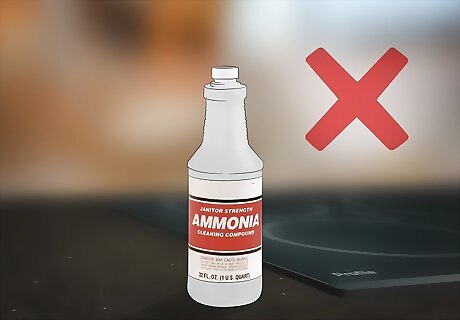
Avoid ammonia-based cleaners. Cleaning with an ammonia/water mix or a cleaning product formulated with ammonia cannot effectively clean anything but light dirt and fingerprints from ceramic stovetops. Using such cleaners could lead to iridescent stains on the surface. Avoid abrasive cleaning products. Chemical cleaners like Comet and Ajax will damage your ceramic stovetop. Do not use these products. Likewise, steel wool and abrasive scouring pads will scratch the surface of your ceramic stovetop.
Removing Burn Marks
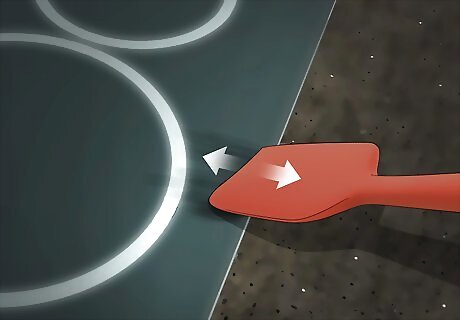
Rub the stain with a silicone spatula. Move the spatula around the stain with small circular motions. This will loosen the debris that forms the stain and make the color fade.
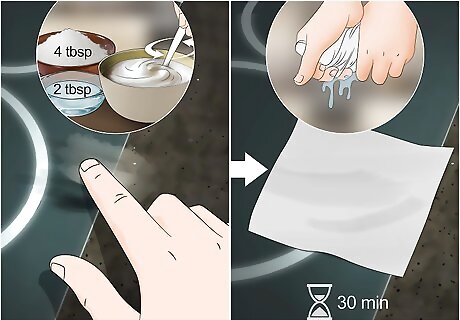
Make a baking soda paste. Mix four tablespoons baking soda and one or two tablespoons of water. Smear the baking soda on the burned area with your finger or with a sponge. Cover the area with a warm, damp rag. Wait 30 minutes.
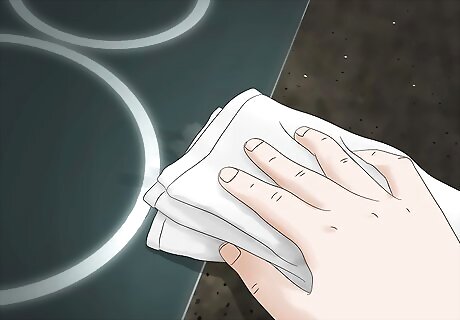
Wipe the area clean. After 30 minutes has elapsed, use a damp sponge or cloth to wipe the stained area. If some of the stain remains, re-apply the baking soda paste and the damp cloth, and try again. The best cloth to wipe the area with is a microfiber cloth. These cloths are specially designed with more fibers than a normal cloth, meaning they can absorb more of whatever you’re trying to wipe up than regular cloths.
Cleaning Serious Stains or Marks
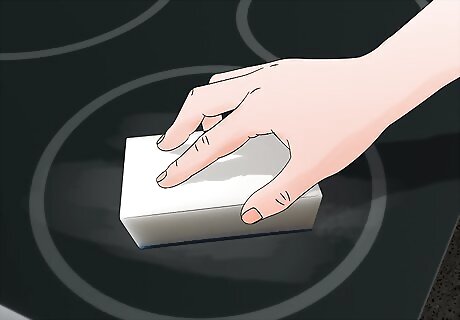
Use a magic eraser. A magic eraser is a special sort of sponge. Its microporous structure allows it to clean surfaces that prove impossible to clean via normal methods. If your ceramic stovetop has resisted baking soda and razor scraper cleaning solutions, try a magic eraser. You can obtain a magic eraser at your local big box grocery store, or online.
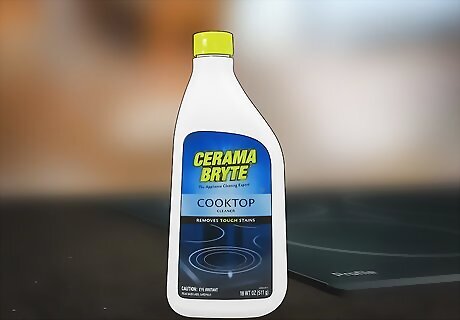
Use a specially-formulated cleaning product. There are a number of products available designed specifically to clean ceramic stovetops. Cerama Bryte and Cook Top are two such specialized ceramic cooktop cleaners. Each cleaning product is slightly different, so consult manufacturer instructions for more detailed information regarding use. Generally, you’ll spray or sprinkle your stovetop with the specially-formulated cleaning agent, then wipe the surface with a damp rag or sponge. These products are useful for cutting through grease stains and burned-on material.
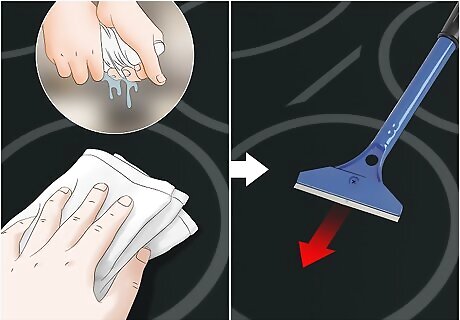
Scrape away remaining debris. If, after wiping the ceramic stovetop down with baking soda and a damp rag, it is still not clean, use a razor scraper to scrape the debris off. A razor scraper is a small tool consisting of a handle and a razor blade with its edge facing out. Run the blade along the burned material at a sharp angle by keeping the blade and its handle as close as possible to the surface of the ceramic stovetop. Wipe the stovetop with a damp, soapy sponge before scraping it with the razor scraper. Do not move the blade in a direction that runs parallel to the blade or you’ll scratch the surface of the cooktop. Always move the blade in a direction that is perpendicular to it. Cleaning the stovetop with a razor scraper should be a last resort.


















Comments
0 comment